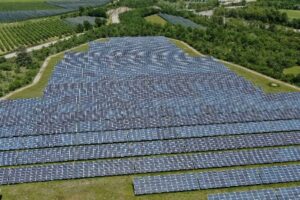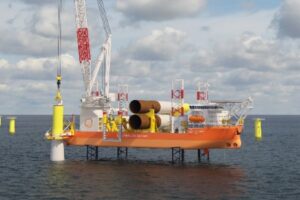Ribbon cut on French ‘gigafactory’ producing 16,000 hydrogen fuel cells a year — but who is buying?

French fuel-cell company Symbio yesterday inaugurated its SymphonHY “gigafactory” in Lyon, France, which will produce 16,000 fuel cells a year.
The construction of the factory — which assembled its first fuel cell in October —had been supported by state aid from the French government, unlocked via EU designation as an Important Project of Common European Interest.
While Symbio has not disclosed how much was awarded, a spokesperson for the company has hinted to Hydrogen Insight that it was in “the hundreds of millions” of euros.
Sources familiar with the matter have suggested that the company had received €600m ($647m) in government funding, or 60% of the €1bn invested into the factory.
Previous announcements had scheduled an increase in annual production capacity at the plant to 50,000 fuel cells in 2025, the company is now eyeing this scale-up for 2026 instead.
Symbio — owned in equal parts by automaker Stellantis, tyre giant Michelin and car parts supplier Forvia (formerly Faurecia) — also plans to build a second gigafactory by 2028, bringing total annual production capacity to 100,000 fuel cells a year.
Article continues below the advert
But will there be buyers for this many fuel cells?
The spokesperson for Symbio tells Hydrogen Insight that Stellantis is currently the firm’s largest customer by number of fuel cells sold, and therefore “a large portion of our manufacturing capacity will indeed serve to support its deployment plans” for fuel-cell vehicles in Europe.
However, Stellantis only plans to roll out up to 10,000 light-duty hydrogen-powered vehicles next year. Hydrogen Insight has reached out to confirm how many have been produced to date, and production plans up to 2026.
“We do have other customers in areas such as bus, coach and forklift applications that will also be supported from SymphonHy,” the Symbio spokesperson added.
“With Symbio, we cover 75% of the hydrogen mobility value chain, from fuel cells to storage systems,” Patrick Koller, CEO of Forvia said, adding that the car parts supplier delivered 10,000 hydrogen tanks globally in 2022.
Symbio CEO Philippe Rosier said: “Delivered in less than two years, SymphonHy is testimonial of Symbio’s ability to meet its industrial commitments, underpinning the acceleration of zero-emission hydrogen mobility deployment.”
Last month, Michelin announced a hydrogen vehicle offering through Watèa, its business for transitioning customer fleets to zero-emission options, which includes providing vehicles and refuelling stations, as well as handling administration for subsidy applications.
Europe is expected to see an uptick in fuel-cell vehicles — mainly heavy-duty, as economics have favoured battery-electric options for passenger cars — as stricter emissions standards and requirements for renewable fuel usage come in.
This is also expected to be supported by the EU’s Alternative Fuels Infrastructure Regulation, which mandates H2 refuelling stations built in every “urban node” and every 200km along the core routes of the planned Trans-European Transport Network (TEN-T) by 2030.
Updated to include additional detail on state funding via IPCEI for SymphonHY.







